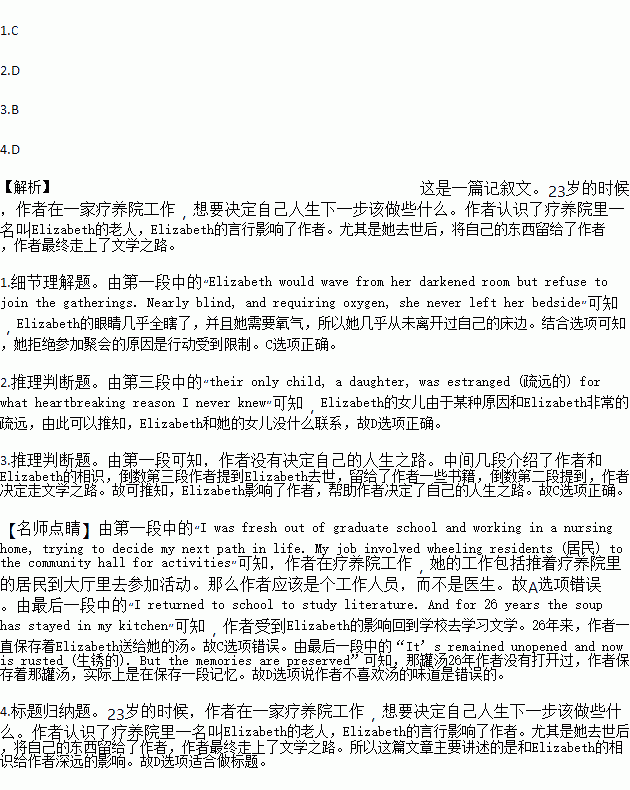题目内容
At 23, I was fresh out of graduate school and working in a nursing home, trying to decide my next path in life. My job involved wheeling residents (居民) to the community hall for activities. Elizabeth would wave from her darkened room but refuse to join the gatherings. Nearly blind, and requiring oxygen, she never left her bedside. I soon learned, though, that she loved books, and every day after work I would read to her.
In dim (微暗的) light we made our way through "King Lear," "Henry IV, .... Jane Eyre," the poems of Rupert Brooke.
Two golden hours might pass before I’ d pack up to return to my apartment. Before I could leave she’ d press my hand, saying, "Child -- my literary child. You bring me such joy." Elizabeth’ s husband had died a decade earlier, and their only child, a daughter, was estranged (疏远的) for what heartbreaking reason I never knew.
One day an old friend of hers visited and brought her some soup. Smiling broadly, Elizabeth squeezed my arm. "Tomorrow, child,we shall feast."
The next evening I found Elizabeth’ s bed empty. "I’ m sorry," the nurse whispered. She handed me a box and nodded. "She left everything to you." At home I unpacked it, finding two white sweaters, the dozen leather-bound books and, at the bottom, the can of soup.
That summer I decided my path. I returned to school to study literature.
And for 26 years the soup has stayed in my kitchen. It’s remained unopened and now is rusted (生锈的). But the memories are preserved.
1.Why did Elizabeth refuse to join the gatherings? -
A. She had many books to read.
B. She was not a very social person.
C. She was restricted in her movements.
D. She had no interest in those activities.
2.What do we know about Elizabeth?
A. She loved writing poems.
B. She often visited her friends.
C. She got divorced ten years ago.
D. She had little contact with her daughter.
3.What can we know about the author?
A. She used to be a doctor.
B. She was inspired by Elizabeth.
C. She taught literature for 26 years.
D. She didn’t like the taste of the soup.
4.What would be the best title for the text?
A. A book-loving friend
B. An unforgettable literary journey
C. An interesting nursing experience
D. A short-term job and its lifelong impact
任务型阅读,请认真阅读下列短文,并根据所读内容在文章后表格中的空格里填入最恰当的单词。
注意:每空格只填1个单词。请将答案写在答题卡上相应题号的横线上。
Everybody loves self-improvement. That’s why we’re such enthusiastic consumers of “top 10” lists of things to do to be a more productive, promotable, mindful— you name it—leader. But these lists seldom work. What if we didn’t think of self-improvement as work? What if we thought of it as play—specifically, as playing with our sense of self?
Traditionally, people work on themselves, committed to doing everything in their power to change their leadership style. You set your goals and objectives, you are mindful of your time, and seek efficient solutions. You’re not going to deviate(偏离) from the straight and narrow. You focus on what you should do, especially as others see it, as opposed to what you want to do. It’s all very serious and not whole of fun. There is one right answer. Success or failure is the outcome. We judge ourselves.
In contrast, no matter what you’re up to, when you’re in “play” mode, your primary drivers are enjoyment and discovery instead of goals and objectives. You’re curious. You lose track of time. Like in all forms if play, the journey becomes more important than a pre-set destination.
Much research shows how play develops creativity and innovation. Play with your own idea of yourself is similar to playing with future possibilities. So, we stop evaluating today’s self against unachievable ideal of leadership that doesn’t really exist. We also stop trying to will ourselves to “commit” to becoming something we are not even sure we want to be—what we call the “feared self”, which is composed of images negative role models. And, we shift direction from submitting to what other people want us to be to becoming more self-authoring. As a result, when you play, you’re more creative and more open to what you might learn about yourself.
Unfortunately, we don’t often get —or give ourselves—permission to play with our sense of self. In life, we equate playfulness with the person who dips into a great variety of possibilities, never committing to any. We find inconsistency distasteful, so we exclude options that seem too far off from today’s “authentic self”, without ever giving them a try. This kills the discontinuous growth that only comes when we surprise ourselves.
Psychoanalyst Adam Phillips once said, “people tend to play only with serious things—madness, disaster, other people.” Playing with your self is a serious effort because who we might become is not knowable or predictable at the start. That’s why it’s as dangerous as it is necessary for growth.
Lead-in |
|
2.between the two mode | In work mode |
In play method | |
The8.with application of play mode | We usually regard playfulness as equal to non-professional. |
9. | 10.danger, playfulness is a must for our self-growth. |

